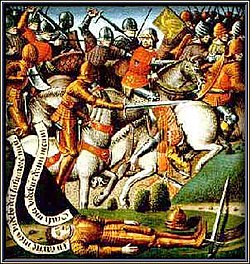
Back Batalla de Roncesvals AN معركة ممر رونسفال Arabic قذرقاه رونسوال دؤیوشو AZB Битка при прохода Ронсево Bulgarian Emgann Roncevaux (778) Breton Batalla de Roncesvalls Catalan Bitva v průsmyku Roncevaux (778) Czech Brwydr Ronsyfal Welsh Schlacht von Roncesvalles German Batalo de Roncesvalo Esperanto
| Battle of Roncevaux Pass | |||||||
|---|---|---|---|---|---|---|---|
| Part of Charlemagne's campaign in the Iberian Peninsula | |||||||
 15th-century anonymous painting of the Battle of Roncevaux Pass | |||||||
| |||||||
| Belligerents | |||||||
| Franks (Christian) | Basques (pagan) | ||||||
| Commanders and leaders | |||||||
|
Charlemagne Roland † |
Unknown (speculated: Lupo II of Gascony or Bernardo del Carpio) | ||||||
| Strength | |||||||
| 3,000 soldiers who were crossing the pass (modern est.)[1] | Unknown but large[2][3] | ||||||
| Casualties and losses | |||||||
| All the men in the rearguard were killed. | Unknown | ||||||
The Battle of Roncevaux Pass (French and English spelling, Roncesvalles in Spanish, Orreaga in Basque) in 778 saw a large force of Basques ambush a part of Charlemagne's army in Roncevaux Pass, a high mountain pass in the Pyrenees on the present border between France and Spain, after his invasion of the Iberian Peninsula.
The Basque attack was in retaliation for Charlemagne's destruction of the city walls of their capital, Pamplona. As the Franks retreated across the Pyrenees back to Francia, the rearguard of Frankish lords was cut off, stood its ground, and was wiped out.
Among those killed in the battle was Roland, a Frankish commander. His death elevated him and the paladins, the foremost warriors of Charlemagne's court, into legend, becoming the quintessential role model for knights and also greatly influencing the code of chivalry in the Middle Ages. There are numerous written works about the battle, some of which change and exaggerate events. The battle is recounted in the 11th century The Song of Roland, the oldest surviving major work of French literature, and in Orlando Furioso, one of the most celebrated works of Italian literature. Modern adaptations of the battle include books, plays, works of fiction, and monuments in the Pyrenees.